lesson17
新概念英语第二册_Lesson17
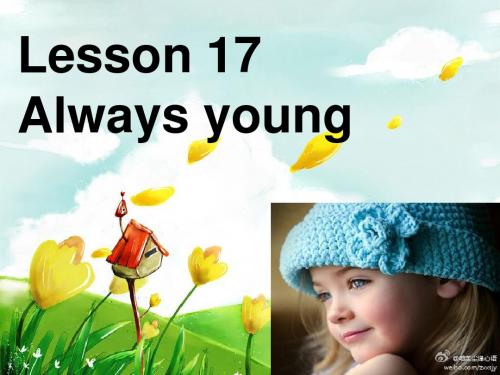
5、In the play, she must appear in a bright red dress and long black stockings. in (+颜色、衣服) 穿着……样的衣服,用介词短语 取代动词,避免了一句话中出现两个动词 The boy is in green. She is in jeans . in a bright red dress 鲜红色的连衣裙 bright,orange-coloured dress 鲜艳的桔黄色衣 服 wear wear a beard 留胡子 [n]穿戴的衣服 men’s wear underwear 内衣 don’t show your underwear in the sun
I can’t come as I am busy . As I was leaving the house ,the postman brought the letter. Do as I told you . He works as an engineer.
4、Jennifer will have to take part in a new play soon. join 参加了某一种团体,成为其中一员 join in :参加入一种娱乐活动或者游戏 join in the game join the army 参军 join the party 入党 join us (口语)加入我们(这个团体)中来 take part in :参加某一种活动 take part in the race 参加比赛 take part in a play take part in the sports meeting . attend:出席 attend the meeting . attend the party 出席宴会 attend the class 上课 Thank you for your attending. 谢谢大家的出席(到来) Thank you for your listening. 谢谢大家的听讲
Lesson17 教材知识详解
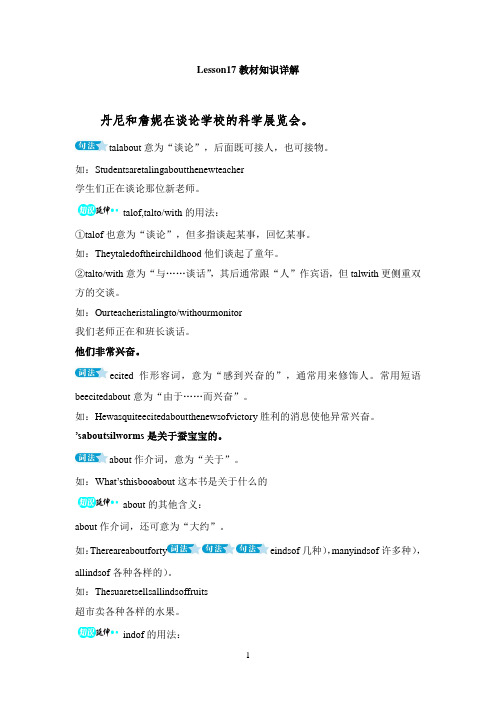
Lesson17教材知识详解丹尼和詹妮在谈论学校的科学展览会。
talabout意为“谈论”,后面既可接人,也可接物。
如:Studentsaretalingaboutthenewteacher学生们正在谈论那位新老师。
talof,talto/with的用法:①talof也意为“谈论”,但多指谈起某事,回忆某事。
如:Theytaledoftheirchildhood他们谈起了童年。
②talto/with意为“与……谈话”,其后通常跟“人”作宾语,但talwith更侧重双方的交谈。
如:Ourteacheristalingto/withourmonitor我们老师正在和班长谈话。
他们非常兴奋。
ecited作形容词,意为“感到兴奋的”,通常用来修饰人。
常用短语beecitedabout意为“由于……而兴奋”。
如:Hewasquiteecitedaboutthenewsofvictory胜利的消息使他异常兴奋。
’saboutsilworms是关于蚕宝宝的。
about作介词,意为“关于”。
如:What’sthisbooabout这本书是关于什么的about的其他含义:about作介词,还可意为“大约”。
如:Thereareaboutforty eindsof几种),manyindsof许多种),allindsof各种各样的)。
如:Thesuaretsellsallindsoffruits超市卖各种各样的水果。
indof的用法:indof意为“有点儿;有几分”,用于修饰形容词或副词,表示程度,多用于口语中。
同义短语为alittle,abit,alittlebit。
I’mindofhungry我有点儿饿了。
Sheloosindofpaleafterherillness她生病后面色有点苍白。
而且人们都可以品尝。
all作形容词,意为“所有的,整个的”,修饰可数名词复数或不可数名词。
其位置须放在定冠词the、指示代词或物主代词之前,即“allthe/指示代词/物主代词名词”。
lesson17

(2)true “真的”,指符合实际情况的,不 是杜撰的,与false相对
Is this a true story ?
will be 将会是,will为助动词,用于将来时。
一般将来时表示:从当前时间来看,将要发 生的动作或从在的状态。 肯定结构:主语+will+动词原形+其他 我要养一只狗当宠物。 I will have a dog for pet.
. Play
basketball play football
(2)play vt. 演奏(乐曲),播放(唱片…), 与西方乐曲搭配时要有冠词the,与中国乐器搭 配时不用冠词。 He often plays the piano .
He often plays Erhu.
real adj. “真正的,真实的,现实的,实际的”
Homework
1. Write something about your pet. 2. Write the new words five times.
They are brown .They have small ears and black
dog
Nose.They are lovely.
Play with 与……玩耍; 玩…… •Don’t play with the fire. It’s dangerous!
•Now my little brother is playing with his toys in the room . (1). play vt. 踢、打(球), play与球类名词间 不加任何冠词。
Jenny
Danny
Brian
cat
Imaginary monkey duck
新概念英语第二册Lesson17课件

宾语从句用陈述句语序
不定式是真正的主语
可怕的
长大,成熟
2024/5/30
have to有人称的改变
have to的句型变化要 用助动词
情态动词可以直接用于将来时
2024/5/30
have to用于将来时需要加will
must和have to
1.must是情态动词,没有人称改变,没有过去式 must+动词原形可以用于现在时和将来时
2.have to是实意动词,有人称改变,有多种时态 一般过去时 had to 一般将来时 will have to
3.从意义上来说,must更加强调主观意愿 have to更加强调外界强迫
2024/5/30
4.过去时中表达“必须”只能用had to
2024/5/30
就个人而言
5.must可以表示推测,意为“一定,肯定” 此时不能用have to 代替,have to只能表示“必须,不得不”
2024/5/30
形 必须的 式 主 语
真正的主语
2024/5/30
You must see a doctor. You will have to see a doctor. Must you make so much noise? Do you have to make so much noise?
思想成熟 grow up表示“长大,成熟”, 意为生理或者思想上的成熟 只能用于人
2024/5/30
当…时
2024/5/30
2024/5/30
当(连词) 如同,照…的方式(连词) 作为(介词)
2024/5/30
因为(连词) 作为(介词)
2024/5/30
连衣裙 dress也可以表示“服装”, 此时为不可数名词
新概念三册Lesson17备课笔记ppt
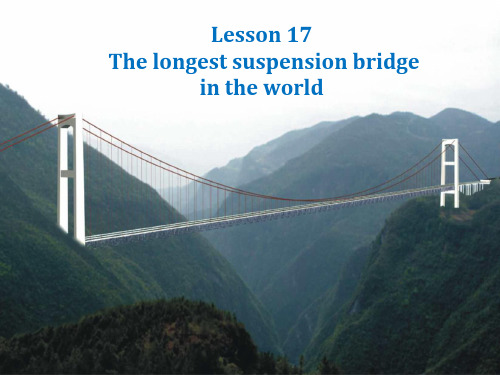
• 2)所有这些动词也可直接带that从句 • -我估计他们已挣了一百多万。 • -I estimated (that) they have made more than a million. • -We suppose that he is at work today. • =We suppose him to be at work today.
• immortal adj.永生的,流芳百 世的 • 不死的灵魂 • the immortal soul • 不朽的艺术作品 • an immortal work of art • -Wuthering Heights is Emily Bronte's immortal love story.
• • • • • • • • •
span n.跨度 Memory span 记忆的广度,存储器的容量 Spanner 扳手,螺丝扳手 life span 人的寿命 Time ~ 时间间隔
• • • • • • • • •
cable n. 1)缆索,电缆 ~ television 有线电视 CNN(Cable News Network) 美国有线电视新闻网 数字电视 digital television (HDTV)高清电视 High DefinitionTelevision n.2)电报 send a ~
• • • • • • • •
2)发出(邀请,欢迎) ~ an invitation ~warm welcome ~ one’s greetings 问候 3)提供 -The country ~ aid to needy scholars. ( 贫困的学者)
• • • • •
Faintly adv. 1)微弱地 -She smiled at him faintly. Faint adj.微弱的;勉强的 -A faint smile crossed the her face . -一丝勉强的微笑从她的脸上掠过 。 • Faintly 2)勉强地 • -She smiled at him faintly.
lesson17
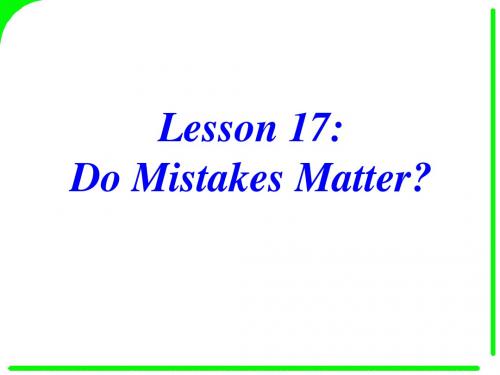
“Thanks, Li Ming,” says Bruce, but he looks confused. “谢谢,李明,”布鲁斯说,但是它看上去 很迷惑的样子。 confused adj.迷惑的,糊涂的 Jenny looks confused when we talk about our ages. 当我们谈论年龄时,珍妮看上去很迷惑。
【比较】:“花费”种种 sb. pay some money for sth.某人为某物付多少钱 sth. cost sb. some money某物花去某人多少钱 This coat cost me $6.这件上衣花了我6美元。 sth. takes sb. some time. =It takes sb. some time to do sth. 做某件事花费某人多少时间。 The job took us a week. 做这项工作花费了我们一周的时间。
Have you ever paid too much for something? 你曾经为某件物品多付过钱吗? 1)paid是pay的过去式 pay vt (钱)支付,花费;vi.付款 I paid ten dollars for the books.买那些书我花了10美元。 I have already paid for the car.我已经把车款付清了。 【拓展】: pay more attention to +n./v.-ing 多加注意….. Pay more attention to your work. 要多加注意你的工作。 pay a visit to …=pay…a visit 访问 I paid a visit to him yesterday.我昨天拜访了他。
I want to buy ________, too. one
冀教初中英语九年级全册Lesson 17课件
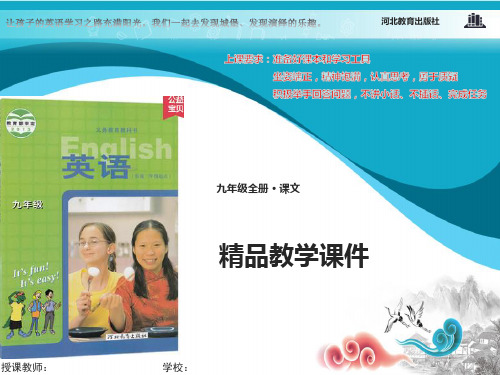
Have you ever experienced an earthquake? When and where?
What is the first thing you should do when an earthquake happens?
Objectives
1. To listen and understand the passage about earthquake
4 Work in pairs. What can you do to help after an earthquake? Discuss your ideas.
Example: We can donate some money to help people rebuild their homes. We can help people by offering some psychological treatment.
_g_e_t_i_n_t_o a water if you
lift.
are close to
the sea.
3 Fill in the blanks with the phrases in the box.
pull over protect…from
stay calm keep an eye out
get as far away from the water as possible.
get under a table or a bed.
move outdoors to an open area.
pull over to a place where there are no trees or tall buildings.
新概念第二册Lesson 17知识要点总结

新概念第二册Lesson 17复习要点一.词汇讲解:1.appear登场,扮演She often appears on the stage as a young girl.她经常在台上扮演年轻的小女孩。
出现A stranger appeared at my door. 一个陌生人出现在我家门前。
appear----disappearlike----dislike2.Stage舞台on the stage 在舞台上3.Stockings长筒袜Christmas stockings 圣诞袜tights紧身裤袜二.认读词汇:personally(就自己的看法而言)fool(傻瓜)necessary(必须的)pilot(飞行员)hire(租)fancy-dress party(化妆舞会)costume(戏服,表演服装)adult(成年人)instead of(代替,而不是)三.情态动词表示推测:She must be rich.她肯定很富有。
She can’t be rich.她不可能富有。
She may be rich.她可能富有。
She must have children.她肯定有孩子。
She can’t have children.她不可能有孩子。
She may have children.她可能有孩子。
四.重点短语:at least 至少in spite of this尽管这样appear on the stage as....在台上扮演......take part in 参加a girl of seventeen一个17岁的女孩=a seventeen-year-old girl an orange dress=an orange-coloured dress五.must和have tomust是情态动词,have to 有人称和时态的变You must see a doctor.You have to see a doctor.Do you have to see a doctor?I don’t have to see a doctor.He has to see a doctor.Does he have to see a doctor?He doesn’t have to see a doctor.He had to see a doctor.Did he have to see a doctor?He didn’t have to see a doctor.。
Lesson17 说课稿

Lesson17 :Staying safe in an earthquake说课稿今天我说课的内容是冀教版九年级上册Unit3的Lesson17 :Staying safe in an earthquake。
下面就教材分析、教法设想、学法指导及教学过程来说一下这节课。
一.说教材1.教材分析本节课位于九年级上册第三单元第十七课,本课主要让同学们掌握有关灾难中自救的文章,能够听懂并从中获取有效信息。
2.教学目标知识目标 1)掌握词汇及短语: earthquake, calm, object, system, survival能力目标:提高学生听、说、读、写及能用所学单词和句型进行表达。
情感目标:通过形象、生动的教学使同学们学会如何在灾难中自救。
并如何帮助地震中的人们二。
说教法为了更好地突出重点,突破难点,我主要采用了:1.任务型教学法:它极大地调动了学生的积极性。
2.分层教学法:达到了生生互动、关照两头的效果;3. 讲练结合教学法:知识点讲解的同时,达到活学活用。
4.竞赛教学法:根据初中生争强好胜的特征。
我每堂课都进行俩俩对话。
激发学生兴趣,给学生创造外语语言氛围培养学生集体荣誉感。
三、说学法1.积极回答问题,善于抓住用英语交际的机会,积极体验,大胆实践。
课堂上有大量的提问,还有抢答题,都要求学生个别回答,鼓励学生积极回答问题,大胆开口讲英语。
2.积极参于,学会合作。
本课设计了两个合作学习的任务,操作简单,学生一定很感兴趣并且积极地参与其中,从而合作完成任务,培养了团队精神。
3.积极预习,同学达到有备而战,课堂知识点轻松而有目标的完成。
四.说教学过程1.导入新课。
通过放映图片,提问题W hat’s this ?It’sa map of China.What does it look like ? It looks like a cock.Do you know about China ?What are symbols of China ? ( Show some pictures) Do you know more about China ?(开展话题讨论,创设英语氛围,活跃课堂气氛,调动学习积极性。
冀教版九年级上册英语lesson17翻译

Lesson 17: Staying Safe in an Earthquake第十七课:在地震中保持安全Earthquakes usually come without warning.地震通常没有任何先兆。
What should you do if this happens to you?如果发生地震,你该怎么做?Stay calm as the earth begins to shake and move.地面开始摇晃移动时,保持冷静。
An earthquake is dangerous, but there are things you can do to protect yourself.地震是危险的,但你可以做一些事情来保护你自己。
If you are inside when the earthquake starts, get under a table or a bed. 当地震发生时,如果你在室内,躲在桌子或床下。
You need to have something strong around you to protect you from falling objects.你需要有牢固的事物来保护你避开掉下来的物体。
Do not stand near walls or windows and stay out of the kitchen.别靠着墙壁或窗户站立,远离厨房。
The kitchen is dangerous because there are so many glass objects.厨房危险因为那里有许多玻璃制品。
Also, never get into a lift during an earthquake.同样,地震期间,绝不进入电梯。
If you are outside, get to an open area as fast as you can.如果你在室外,尽可能快地去一片开阔的地方。
七年级英语下册Lesson17教材内容详解冀教版

Lesson 17 A taxi to the Hotel到旅馆的出租车◆课文英汉对照THINK ABOUT IT! 想一想!●Do you like to take taxis?Why or why not?你喜欢乘出租车吗?为什么喜欢或为什么不喜欢●Have you ever stayed in a hotel?When? Why?你曾经呆在过一个旅馆吗?什么?时候在哪儿?●Why is Danny scared?为什么丹尼害怕了?Mrs.Li:Okay,everyone. Let,’s go to our hotel. 李太太:好的,大家。
让我们去我们的旅馆。
Danny: Okay!let’s walk.丹尼:好的!我们走着去吧。
Jenny:Danny! It’s too far.詹妮:丹尼!太远了。
Danny:Oh!丹尼:噢!Li Ming:Let’s a taxi.There is one. You can speak Chinese with the driver, Danny.李明:让我们乘出租车去吧。
有一辆车。
你可以和司机讲汉语,丹尼。
Danny:(He speaks in Chinese) ni hao ,driver! 丹尼:(他用汉语说)你好,司机。
Driver:ni hao Li Ming:Sorry,Danny!李明:对不起,丹你!Jenny:There are so many bicycles, cars and buses here. And so many people!詹妮:这儿有这么多的自行车,小汽车和公共汽车。
并且有很多的人。
Driver:Yes!And many interesting place.司机:是的!还有许多名胜。
Danny:(He is surprised) Hey,driver! You speaking English !Please don’t drive so quickly!There is a bicycle!There is another car!Please driver slowly. I’m scared.丹尼:(他吃惊了。
Lesson17说课稿
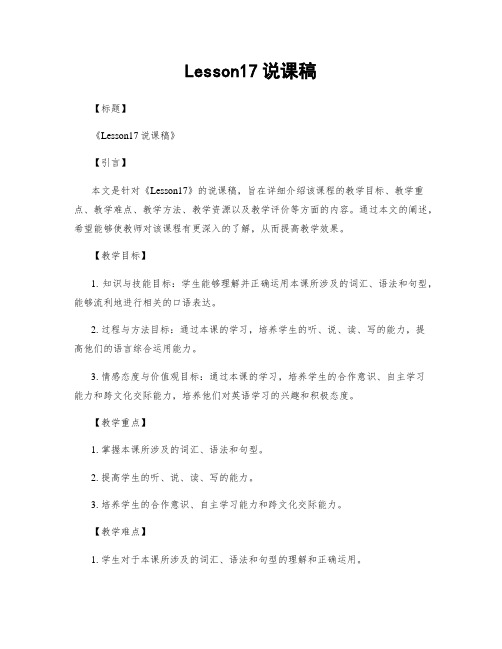
Lesson17说课稿【标题】《Lesson17说课稿》【引言】本文是针对《Lesson17》的说课稿,旨在详细介绍该课程的教学目标、教学重点、教学难点、教学方法、教学资源以及教学评价等方面的内容。
通过本文的阐述,希望能够使教师对该课程有更深入的了解,从而提高教学效果。
【教学目标】1. 知识与技能目标:学生能够理解并正确运用本课所涉及的词汇、语法和句型,能够流利地进行相关的口语表达。
2. 过程与方法目标:通过本课的学习,培养学生的听、说、读、写的能力,提高他们的语言综合运用能力。
3. 情感态度与价值观目标:通过本课的学习,培养学生的合作意识、自主学习能力和跨文化交际能力,培养他们对英语学习的兴趣和积极态度。
【教学重点】1. 掌握本课所涉及的词汇、语法和句型。
2. 提高学生的听、说、读、写的能力。
3. 培养学生的合作意识、自主学习能力和跨文化交际能力。
【教学难点】1. 学生对于本课所涉及的词汇、语法和句型的理解和正确运用。
2. 学生在口语表达中的流利程度和准确性。
【教学方法】1. 情景教学法:通过创设真实的情境,让学生在实际交际中学习和运用语言。
2. 合作学习法:通过小组合作、角色扮演等活动,培养学生的合作意识和交流能力。
3. 多媒体教学法:通过利用多媒体资源,如图片、视频等,激发学生的学习兴趣,提高他们的学习效果。
【教学资源】1. 教材:《Lesson17》课本、教师用书。
2. 多媒体资源:投影仪、电脑、音频设备等。
3. 教学辅助工具:黑板、彩色粉笔、PPT等。
【教学过程】1. 导入:通过展示一段相关的视频或图片,引发学生对本课主题的兴趣,激发他们的学习欲望。
2. 呈现新课:通过教师的讲解和示范,向学生介绍本课所涉及的词汇、语法和句型,帮助他们理解和掌握相关知识。
3. 合作学习:将学生分成小组,进行角色扮演、对话练习等活动,让学生在实际交际中运用所学知识,培养他们的口语表达能力和合作意识。
4. 拓展训练:通过听力、阅读等训练,提高学生的听、说、读、写的能力,巩固所学知识。
Lesson17
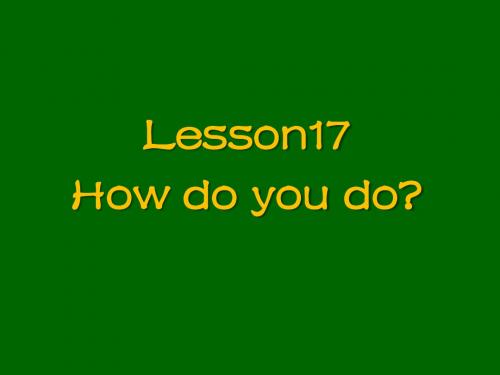
rk:
• 背诵lesson17 • 抄写所有单词,lesson17and lesson18 • 完成语法练习lesson17 and lesson18
culture
• How do you do ? • Nice to meet you! • 握手礼仪:主人,长辈, 上司,女士主动伸出手, 客人,晚辈,下属,男士 在相迎握手。
Lesson 18 What are their job?
• 1 如果名词是以-f或-fe结尾的,变成复 数时,一般要把-f或-fe变成-v,再加es, • 如housewife----housewives。 2 英语中有一些名词的复数形式是不规 则的,如man, woman, 以及由这两个词 组成的复合名词: man----men; woman----women; milkman----milkmen; policewoman----policewomen。
• 6 Are they very busy? • 7 Who is the young man? • 8 Is Jim a sales rep or an office assistant? • 9 Is Jim very busy? • 10 Is he hard-working?
• Ask me if Nicola Grey is a keyboard operator. • Ask me if Claire Taylor is very busy. • Ask me if Michael Baker and Jeremy Short are keyboard operators • Ask me if the two men are lazy.
Lesson17 How do you do?
北京版六年级上册英语 lesson 17
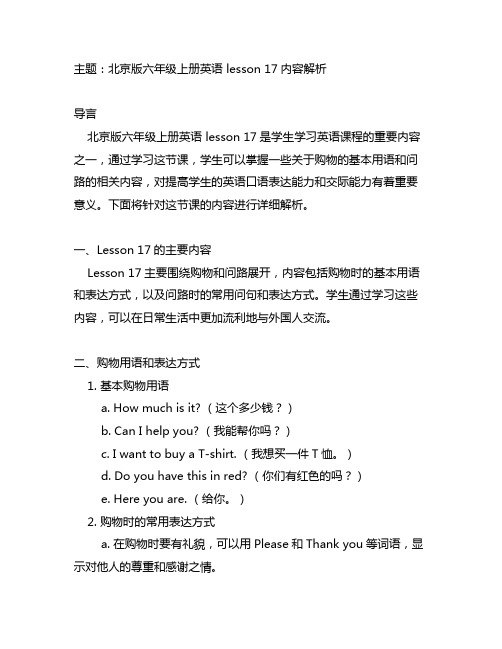
主题:北京版六年级上册英语 lesson 17内容解析导言北京版六年级上册英语 lesson 17是学生学习英语课程的重要内容之一,通过学习这节课,学生可以掌握一些关于购物的基本用语和问路的相关内容,对提高学生的英语口语表达能力和交际能力有着重要意义。
下面将针对这节课的内容进行详细解析。
一、Lesson 17的主要内容Lesson 17主要围绕购物和问路展开,内容包括购物时的基本用语和表达方式,以及问路时的常用问句和表达方式。
学生通过学习这些内容,可以在日常生活中更加流利地与外国人交流。
二、购物用语和表达方式1. 基本购物用语a. How much is it? (这个多少钱?)b. Can I help you? (我能帮你吗?)c. I want to buy a T-shirt. (我想买一件T恤。
)d. Do you have this in red? (你们有红色的吗?)e. Here you are. (给你。
)2. 购物时的常用表达方式a. 在购物时要有礼貌,可以用Please和Thank you等词语,显示对他人的尊重和感谢之情。
三、问路常用问句和表达方式1. 常用问句a. Excuse me, where is the nearest post office? (对不起,请问最近的邮局在哪里?)b. Can you tell me the way to the railway station? (你能告诉我去火车站的路吗?)c. Is there a bank around here? (这附近有银行吗?)d. How far is it to the nearest hotel? (到最近的酒店有多远?)2. 表达方式a. 在问路时,要用礼貌的语气和姿态,表示尊重和礼貌。
四、Lesson 17的学习重点和难点1. 学习重点a. 掌握购物和问路的基本用语和句型。
b. 提高学生的口语表达能力和交际能力。
Lesson17(课件)新概念英语第一册
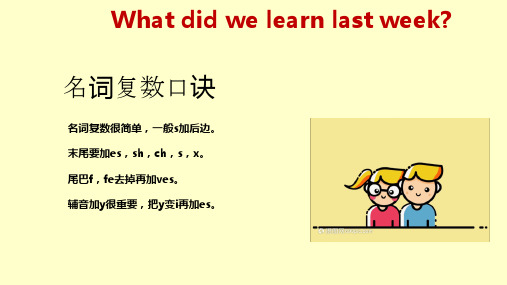
What are __th_e_i_r_ jobs?
(they/their/them)
They are hairdressers.
What are their jobs?
They are engineers.
What are their jobs?
They are keyboard operators.
He's very ____.
The man is very ____.
The ____ is very lazy.
He's an ____ worker.
She's an office ____.
Lesson 17
How do you do?
Number the pictures. ⑤ ⑥ ④ ② ③ ①
What did we learn last week?
名词复数口诀
名词复数很简单,一般s加后边。 末尾要加es,sh,ch,s,x。 尾巴f,fe去掉再加ves。 辅音加y很重要,把y变i再加es。
牙足鹅 oo 变
a tooth
three teeth
a foot a goose
two feet four geese
Let's do exercise.
1. boy __b_o_y_s_____ 2. sheep __s_h_e_e_p__ 3. child _c_h_i_ld_r_e_n__ 4. box ___b_o_x_e_s__ 5. this __t_h_e_s_e____ 6. girl friend_g_i_r_l _fr_i_e_n_d_s_ 7. apple tree__a_p_p_l_e_t_r_e_es___ 8. woman doctor_w__o_m__en__d_o_c_t_o_r_s_
Lesson17

教案:Lesson 17.《I'm Lost!》20232024学年英语四年级上册冀教版(三起)教学目标:1. 能够听懂、会说、会读本课的生词和句子。
2. 能够运用所学句子和词汇描述自己的位置和方向。
3. 能够通过情景对话,培养学生的交际能力和解决问题的能力。
4. 培养学生的空间感和方位感。
教学内容:1. 生词:post office, bank, supermarket, hospital, restaurant, police station, school, library, park, zoo2. 句子:1. I'm lost. Can you help me? 2. Yes, I can. How can I help you?3. Where is the post office?4. It's near the bank.5. Thank you very much.教学重点与难点:1. 重点:能够听懂、会说、会读本课的生词和句子,能够运用所学句子和词汇描述自己的位置和方向。
2. 难点:能够通过情景对话,培养学生的交际能力和解决问题的能力。
教具与学具准备:1. 教具:PPT、卡片、地图、实物等。
2. 学具:课本、练习册、笔等。
教学过程:Step 1: 热身(5分钟)1. 老师带领学生复习上一课的内容,通过问答的形式巩固所学知识。
2. 学生进行小组活动,用所学词汇和句子进行自我介绍。
Step 2: 生词学习(10分钟)1. 老师通过PPT展示生词,引导学生跟读并记忆。
2. 学生通过小组活动,用生词进行对话练习。
Step 3: 句子学习(10分钟)1. 老师通过PPT展示句子,引导学生跟读并理解意思。
2. 学生通过小组活动,用所学句子进行对话练习。
Step 4: 情景对话(10分钟)1. 老师通过PPT展示情景对话,引导学生跟读并理解意思。
2. 学生通过角色扮演,进行情景对话练习。
Lesson 17 课件 冀教版英语七年级下册
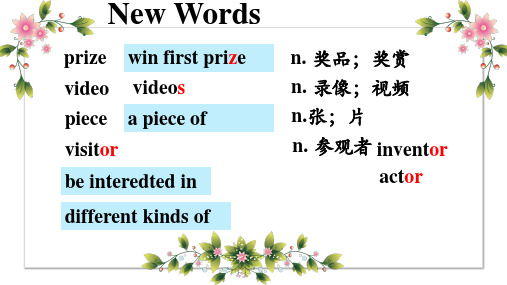
Jenny’s project is about silk worms and Danny’s project is about donuts.
3.What did Jenny make for her project??
She made a video. 4.What does Danny think of silk worms?
这个男孩曾经w对as数in学te感re兴ste趣d 。in Once the boy ______________ math. 你对弹吉他感兴趣吗?playing Are you interested in ________ (play) the guitar?
4. I have a small piece of old silk. 我有一块旧丝绸。 a piece of 一张, 一片( 可修饰不可数名词)
She has a small piece of old silk. She also has a silk worm for the visitors.Danny’s project is all about donuts. He will make 10 different kinds of donuts!
New Words
prize win first prize video videos piece a piece of visitor be interedted in different kinds of
n. 奖品;奖赏 n. 录像;视频 n.张;片 n. 参观者 inventor
actor
NiLghetsFsaoirn(夜1F市7low)SecrhFoaoirl(花展Sc) ience Fair(科学展会)
- 1、下载文档前请自行甄别文档内容的完整性,平台不提供额外的编辑、内容补充、找答案等附加服务。
- 2、"仅部分预览"的文档,不可在线预览部分如存在完整性等问题,可反馈申请退款(可完整预览的文档不适用该条件!)。
- 3、如文档侵犯您的权益,请联系客服反馈,我们会尽快为您处理(人工客服工作时间:9:00-18:30)。
习
案
(一).根据句意写出单词或短语。
1.What's the问题)with you today?
2.I have a胃疼).
3.My mother has a头疼.)Her head hurts in the
after noon.
4.Please take some药)a nd you'll be OK.
have a good rest,Are you OK? You'd better go and see a doctor..
I have a headache /stomachache/cold . What's the matter ?
过程与方法:自主学习、合作探究、。
情感态度和价值观:能用英语表达看医生。
stomachaches尼的胃疼。
究
3.had better意思是最好干,..,是一个固疋词组。用法类似于情 态动词,肯疋句后面接动词原形,否疋句在better后加not。
案
You had better
(stay )home today.
You had better
(not stay) home today.
Choose the right an swers
I.You may have a cold.You n eed see a.()
A doctor B
teacher C studentD worker
检
2.Da nny
a stomachache.()
A is B are
C haveD has
测
3.My arm
5.After the exam in ati on,l n eed to have a good休息).
6.It is raining.You must停留)hera
7.This skirt is(更好的)than that one.
I.What's the matte这是看病时,医生询问病情的常用语还可 以说成What' s wrong或者What' s the trouble? Matter问题, 事情”后面跟介词with例如:What' s the matter with him ?跟 踪训练
重点
1have a stomachache/headache had better...What's the matter ? stay
and have a good rest
难点
句型You' dbetter do sth. I have a headache/stomachache .What'he matter ?
C.tak ing
我的 收获
昭仁中学七年级
科目 英语 内容Lesson17Seei ng a doctor课时
年级
知
口识与能力:
单词写人m
s董亚加
ch授课人er
Dr mat
ter审核人ach
ie
班级
掌
medicine
置握短语及•
stay re
句型组se
jst
e a docto
,学生姓名is
medicin
e,时间h
ome,
学习
目标
.()A hurts B hurt C is hurting D hurting
案
hat's
with your mum( )
A matter B a matterC the matterD matters
5.You'd better
the medicine.()A.take B.to take
your computer?你的
电脑怎么了?
2.表示 患病的两种表达方式.
、r,、t、、亠i、、_-..
表达方式之一:表达方式之—-
His eye
Myhurt(s).My leg hurts.
:I have a(n)+部位+ache .1 have a headache.他的眼睛受伤了。
探
Danny
